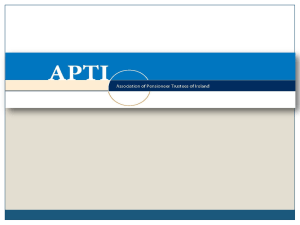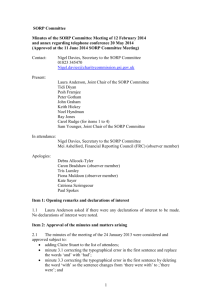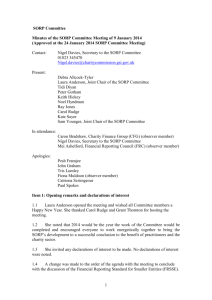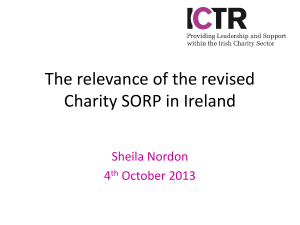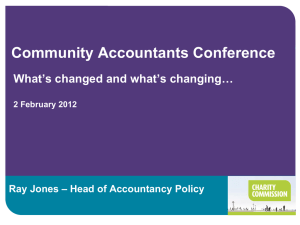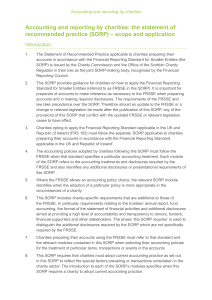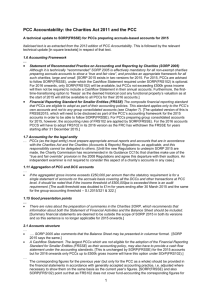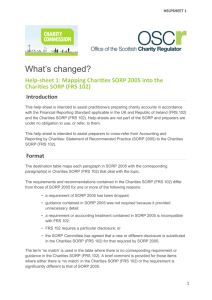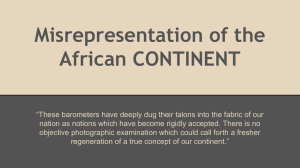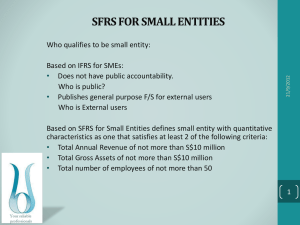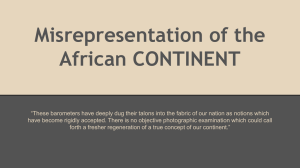Presentation - Charities SORP
advertisement
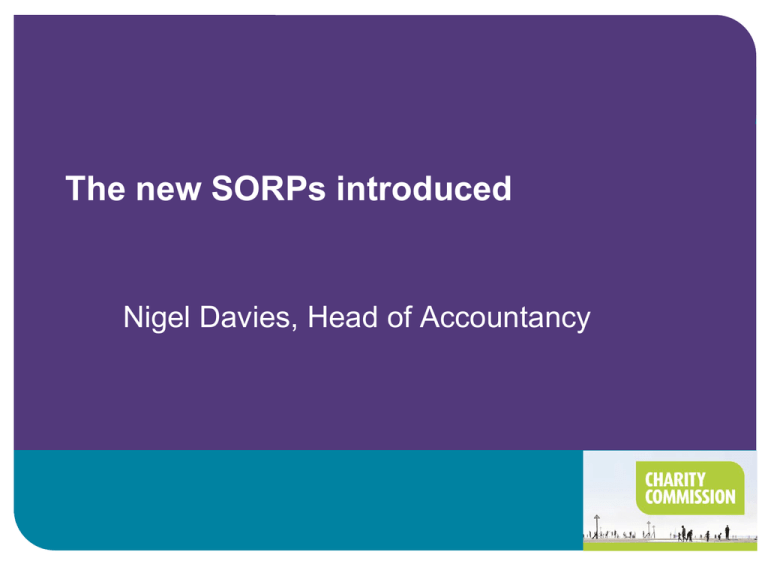
The new SORPs introduced Nigel Davies, Head of Accountancy New SORPs wef 1/1/2015 • • • • • • • Why is charity accounting changing? Why 2 SORPs from 2015? Changes to the trustees’ annual report FRS 102 SORP overview FRSSE SORP overview Controversial topics SORP micro-site Why is charity accounting changing? • UK Generally accepted accounting Practice (GAAP) is changing from 1/1/2015 • New GAAP requires a new SORP • SORP consultation in 2013 with 26 events, 1600 participants and 179 responses • New SORPs take effect for financial years beginning on or after 1 January 2015 • New regulations required Why 2 SORPs? • A separate FRS 102 SORP and a separate FRSSE SORP • Trustees need to make the choice • Why 2 SORPs? Because: – EU accounting Directive (mandatory from 2016) changes small company reporting and FRSSE – A new FRSSE framework likely in 2015-16 – 2 SORPs avoids disruption to FRS 102 users – 2 SORPs simplifies the text of each – Some criticised the combined approach Changes to the Trustees’ Annual Report (all charities) • Common format – whether FRSSE or FRS 102 or cash accounting • Distinguishes requirements of all charities from those of ‘larger’ charities (those subject to statutory audit) as a separate section • Terms used are ‘must’ ‘should’ and ‘may’ • Main changes to content requirements for all charities are: – All trustees must be listed – Must disclose if no reserves policy with reasons What does SORP mean by a larger charity? • Definition is based on the charity audit requirements of: – Gross income exceeds £500,000 or – Gross income exceeds £250,000 and total assets exceed £3.26m • Charities subject to audit are ‘larger charities’ and more is required of them by the charities SORP • Charities not subject to audit are ‘smaller charities’ which have a baseline of reporting under the SORP Changes to the Trustees’ Annual Report (larger charities) • Main changes to content requirements for larger charities are: – An explanation of social investment policies, if applicable – An explanation of the financial effect of significant events – An explanation of principal risks and uncertainties and a summary of plans and strategies for managing them – (Reserves definition – use the SORP one or explain your own) – Arrangements for setting pay of key management personnel and any benchmarks, criteria or parameters used FRS 102 SORP overview • Terms used are ‘must’ ‘should’ and ‘may’ • Identifies where SORP requires more than FRS 102 • Modular approach (hand-out 1): – 14 core modules – incl’ Cash-flow (module 14) – 15 modules followed where applicable • SORP based on FRS 102 (more disclosure and a statement of cash-flows) • New look SoFA (hand-out 2) Main changes (accounts) -1 • See help-sheet 2 for more information: • FRS 102 – all must provide a statement of cash flows • Main changes are: – – – – Sofa and comparatives (module 4) Discounting items to present value Income recognition (module 5) Donated goods for distribution or sale recognise on receipt (subject to cost-benefit and practicality) (module 6) – Expenditure esp. paid leave (module 7) – Related party definition & disclosures (module 9) Main changes (accounts) -2 • Main changes continued: – – – – – Salary bandings apply to all charities now (module 9) Investments (modules 10 and 21) ‘Other financial assets/liabilities’ (module 11) Grant-making disclosures via the web (module 16) Extra payments to multi-employer pension schemes (module 17) – Heritage assets definition and valuation (module 18) – Total return (module 20) – Groups and combinations (modules 23 to 29) FRSSE SORP overview • Terms used are ‘must’ ‘should’ and ‘may’ • Identifies where SORP requires more than FRSSE 2015 • Modular approach (hand-out 1): – 14 core modules – Cash-flow (module 14) optional – 15 modules followed where applicable • New look SoFA (hand-out 3) • FRSSE SORP identifies – FRSSE requirements and permitted FRSSE options – Must follow ‘current practice’ for PBE / charity specific issues – An option to retain existing policies (‘accepted practice’) for other transactions – Otherwise should have regard to current practice (FRS 102) Main changes – SoFAs compared 2005 SORP (SoFA extract) Voluntary income Activities for generating funds Investment income Incoming resources from charitable activities Other incoming resources Total incoming resources FRSSE SORP (SoFA extract) FRS 102 SORP (SoFA extract) Donations and legacies Other trading activities Donations and legacies Other trading activities Income from Investments Income from Charitable activities Other income Income from Investments Income from Charitable activities Other income Total income and endowments Total income and endowments Costs of generating voluntary income Fundraising trading: cost of goods sold and other costs Investment management costs Resources expended on Charitable activities Governance costs Other resources expended Expenditure on Raising funds Expenditure on Raising funds Expenditure on Charitable activities Expenditure on Charitable activities Other expenditure Other expenditure Net incoming/outgoing resources before transfers Net income/(expenditure) Net gains/(losses) on investments Net income/ (expenditure) Gross transfers between funds Transfers between funds Transfers between funds Gains on revaluation of fixed assets for charity’s own use Gains/losses on investment assets Actuarial gains/losses on defined benefit pension schemes Gains/(losses) on revaluation of fixed assets Gains/(losses) on revaluation of fixed assets Net movement in funds Net movement in funds Gains/(losses) on investment assets Actuarial gains/(losses) on defined benefit pension schemes Actuarial gains/(losses) on defined benefit pension schemes Other gains/(losses) Net movement in funds Controversial topics • • • • • • Senior staff salaries and governance costs disclosure Impact/performance reporting for ‘larger’ charities Legacies – codifying practice Government income – whether to disclose Single column SoFA – when to permit Expenditure recognition and grant commitments – codifying practice • Branches – clarifying the definition • Control and dominant influence – how much to explain & how much to cross refer to FRS 102 More on legacies • Module 5 Legacies (FRS 102 ref) [FRSSE ref]: – More guidance on ‘entitlement’ (paragraph 5.29) [5.30] – When is receipt ‘normally’ probable (paragraph 5.31) [5.32]? – Using an estimation technique (numerous immaterial legacies) or not (paragraph 5.32) [5.33] – Post balance sheet event (paragraph 5.33)/contingent asset (paragraph 5.34) [5.34] – Measurement (paragraphs 5.35 and 5.36 – FRS 102 only) – Impairment/bad debt (paragraph 5.37) [5.36] SORP micro-site • Dedicated site: www.charitysorp.org • Micro-site is the location for: – – – – – – – free SORPs and modules ‘Customise your SORP’ 3 help-sheets Order hard copy SORPs Future SORP Committee arrangements Two FRS 102 model examples added Two FRSSE model examples added in 2015
